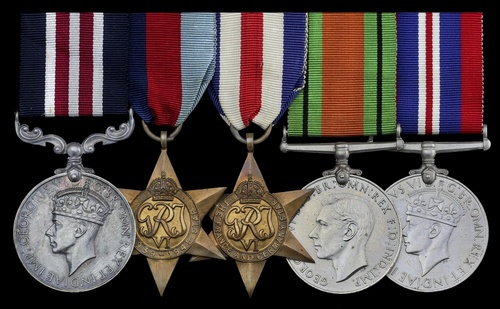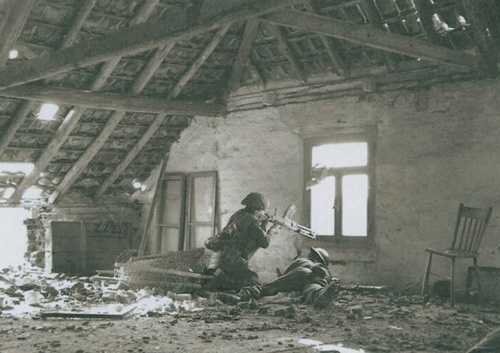Auction: 19002 - Orders, Decorations and Medals
Lot: 248
'No one can fully describe what happened. Small groups stood and fought where they were, forming a thin line with the general direction facing South. German S.P.'s picked off vehicle after vehicle, and we certainly 'bought it'.
No one can give an idea of the many small battles that took place. The column became split up and many gallant actions were fought against German armour and infantry - eventually we became masters of the situation and something like order was restored to the battlefield.'
4th Battalion The Somerset Light Infantry - Campaign in N.W. Europe, June 1944 - May 1945, refers
A poignant immediate 'North-West Europe' operations M.M. group of five awarded to Lance-Corporal J. Stephens, Somerset Light Infantry, a regimental stretcher bearer decorated for his outstanding work during the fierce fighting around Cleve - he would be killed in action near Bremen just 10 weeks later, by a German grenade delivered as he tended a wounded enemy soldier
Military Medal, G.VI.R. (5675630 L. Cpl. J. Stephens. Som. L. I.); 1939-45 Star; France and Germany Star; Defence and War Medals 1939-45, good very fine (5)
M.M. London Gazette 3 May 1945. The original recommendation - for an immediate D.C.M. - by Lieutenant-Colonel C. G. Lipscomb, Brigadier J. Vandeleur (of 'A Bridge Too Far' fame), confirmed by Field Marshal Montgomery, states:
'On 11 February 1945 the Brigade Column was trying to force its way through Cleve when it was attacked, a good deal of confused fighting taking place. Pte. Stephens, a regimental stretcher bearer, had just succeeded in evacuating a casualty into the basement of a house when a tank pulled up outside.
Almost at once it was hit by a SP gun wounding the driver and causing the rest of the crew to bail out. Pte. Stephens, who saw what had happened, left his casualty and dashed to the tank which was again hit by another shell. He succeeded in dragging the driver clear although while he was doing so the tank was hit by another shell and during the whole of the episode its ammunition was exploding.
With the assistance of another man the tank driver was carried into the same cellar as the other casualty. Almost at once the house was hit and caught fire but Pte. Stephens, aided by the other soldier, improvised a stretcher from a garden fence and carried the casualties to another house 50 yards away and again took refuge in the cellar. Shortly afterwards the area of the house was surrounded by the enemy and some soldiers of another unit who were in it, in trying to break out were either captured or became casualties.
Pte. Stephens however hid himself and his two casualties in the cellar and remained undetected for 24 hours when the position was relieved and the Germans turned out. Whilst in this second cellar the tank driver died of his wounds but the other casualty was evacuated by Pte. Stephens as soon as escape became possible when he himself at once rejoined his unit.'
Jack Stephens was born in 1917, a native of Calne, Wiltshire, and served with 'A' Company, 4th Battalion, Somerset Light Infantry during the Second World War. The Battalion landed in Normandy on 19 June 1944 and was soon in action. His deeds at Cleve in early 1945 are referenced in the Regimental History:
'None of us will ever forget Cleve. It was our only consistently unpleasant battle and it had no redeeming features, except that it resulted in ultimate victory. We were successful in the end, but we paid a heavy price.'
Journey's end
Having re-joined his Battalion, Stephens continued to offer gallant service in the actions the unit faced in the campaign. His curtain call however would come in the 4th Battalion's final actions of the war. Advancing upon Bremen, these engagements took place in the period 24 April - 4 May:
'A Company was to fight along the Eastern edge of the Burger Park where it was known that there was at least one concrete bunker housing the headquarters of Bremen defences. The attack was time for last light at 2000 hours...
A and B Companies now came through, attacking northwards as planned. Crocodiles were in support of both Company attacks and the enemy got no quarter - if he attempted to come out of the houses to fight in the open he was caught by fire from our own Bren Guns and the Besas of the crocodiles; if he fought it out from the houses, he was at once burnt.
The whole scene was magnificent and inspiring, with burning houses casting a lurid light over the flame-throwers as the slowly waddled up the streets, and over the infantry as they dashed from house to house. The noise was terrific, with the roar of the flames and the crack and rattle of the small arms fire.
While this attack was in progress, Brigadier Vandeleur and the Commanding Officer appeared at the road junction to see what was going on. The Brigadier, who is an Irishman, found the thirst for battle almost too much for him and it was only with difficulty that the Commanding Officer held him back from joining B Company's leading section!
A Company's attack up the Eastern side of the Park went very well and it was not long before they spotted a huge concrete bunker which was expected to house the Headquarters of Bremen defences. Major Pope, of the 4th Wilts., who came over to contact Major Beckhurst during the battle, assisted in pointing out the bunker and he accompanied Major Beckhurst when, without opposition, he entered it. Beckhurst received the surrender of Major-General Siber, the 2nd-in-Command of Bremen defences and his staff of some 25 officers.
Later the same day General Horrocks visited our H.Q. to congratulate the Battalion on what he described as "a very fine exhibition of street fighting". Such a tribute, coming from him, meant a great deal to us. Although at the time it was naturally not realised, Bremen was to be our last battle, and a finer grand finale could not possibly have been desired.'
18 Platoon, by Sydney Jary, notes the loss of Stephens in the action:
'One of our stretcher bearers, Lance-Corporal Stephens, M.M., was killed by a German grenade as he went to tend a German soldier. 18 Platoon, remembering Sinderen, were justifiably outraged by such unsoldierly behaviour.'
Stephens was killed on 26 April and is buried in the Becklingen War Cemetery, Niedersachsen, Germany. His widow, Phyllis, chose the following epitaph for his gravestone:
'IN LOVING MEMORY OF JACK. HIS LIFE A BEAUTIFUL MEMORY, HIS DEATH A SILENT GRIEF. R.I.P.'
Subject to 20% VAT on Buyer’s Premium. For more information please view Terms and Conditions for Buyers.
Sold for
£1,900
Starting price
£950







